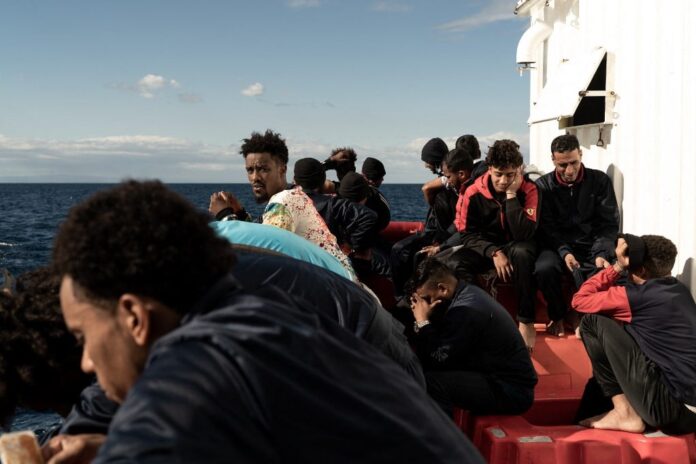LONDON: European countries are employing “double standards” in their treatment of refugees who arrive via the Mediterranean Sea compared with those from Ukraine, a newly published Save the Children report warns.
About one in 50 refugees die or go missing while crossing the Mediterranean during dangerous journeys to Europe, the “Safe for Some” report found. Of those who arrived safely by sea, 20 percent were children.
The charity contrasted the treatment of refugees arriving from the Mediterranean with those granted entry from Ukraine: About 8 million people, 40 percent of whom were children. Those leaving Ukraine “have not faced violence, pushbacks, or had to rely on smugglers when fleeing violence in their country,” Save the Children said.
The report highlighted efforts by European governments to help Ukrainian refugees access accommodation, education and medical care under the EU’s Temporary Protection Directive.
This stands in contrast to the “pushing back” of refugees from Syria who arrive by sea, the organization said, with “almost twice as many refugees from Ukraine having claimed protection under the directive as those who applied for asylum in 2015 and 2016” during the European migrant crisis.
Save the Children Senior Advocacy Adviser Daniel Gorevan, the author of the report, said: “The response to that crisis was dysfunctional at best and cruel at worst.
“It ushered in and hardened measures that continue to restrict the ability of children to seek asylum in the EU — to contain those who arrived, and deter others from coming.
“It doesn’t need to be this way. The welcome extended to Ukrainian families proves European countries can work together to protect traumatized and vulnerable children escaping war.”
Save the Children said: “With safe and legal ways for children to reach Europe and claim asylum closed off, 90 percent of refugees granted protection in European countries are forced to use precarious routes across land and sea.”
The deaths that occur at sea are a result of “harsh and draconian” measures by European countries to prevent migrants entering Europe, it added.
Further restrictions imposed on refugees regarding movement between European countries means that children often face difficulties in reuniting with their families, the charity said.
“The fact that family reunification can take many years in some European countries increases the risk of trafficking and exploitation of children as they attempt to reach families on their own,” it warned.
In compiling the report, Save the Children spoke to refugee children who had experienced violence during their journeys to Europe. Some were stripped naked and forced to stand in the cold, others suffered electric shocks.
A 10-year-old boy who arrived in Greece from Syria said: “It was very difficult. We were walking in the woods for hours, without food or water. We were just walking and praying that everything will be fine.
“But 100 meters before the police station a van took us. There I had a mental breakdown and was not doing well … the police asked us to strip naked and I refused to take everything off.”
The boy’s mother told the organization: “They took us back to the river and they had some really flimsy boats there … we couldn’t see anything and I couldn’t see my son.
“I didn’t know where he was and I was screaming to the masked men that I am not going anywhere without my son.
“On the other side we could see among the trees a man with a gun.”
Gorevan said: “A new European approach — one which puts the rights of all children at the heart of asylum policies — is possible.
“The EU is negotiating a Pact on Asylum and Migration — it has an opportunity and an obligation to put children’s rights at its heart.
“All children fleeing conflict must be offered safe and legal routes to safety, protection, and support to rebuild their lives.”

